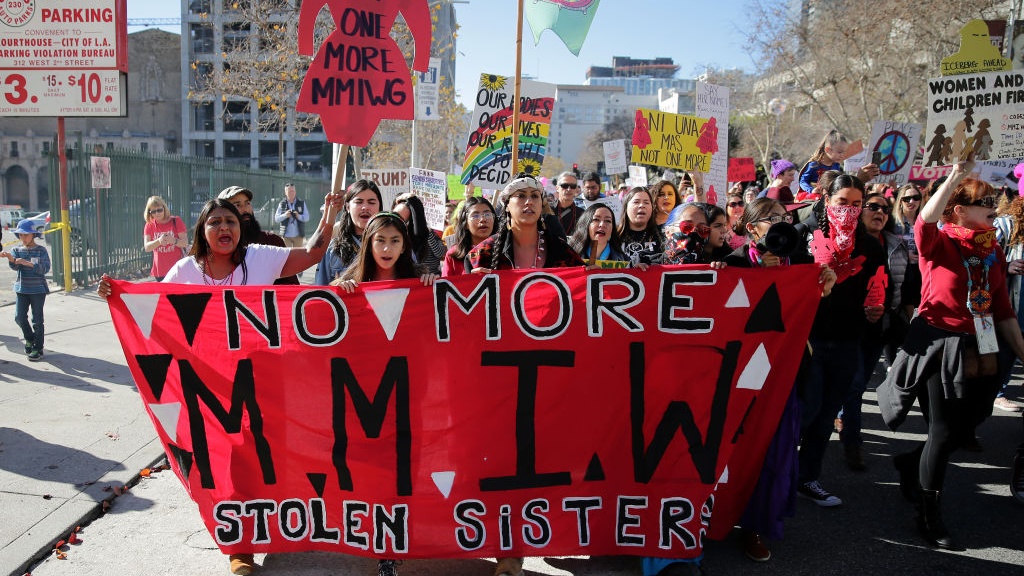After years of diligent lobbying and advocacy by four Native American members of Congress, two critical bills centered around tackling the epidemic of missing and murdered Indigenous women have been officially signed into law, according to USA Today.
Savanna's Act and The Not Invisible Act both seek to address the violence against Native American women by pushing the Department of Justice to coordinate with Native communities more, collect more data and focus on the specific issue of disappearances. Trump signed the two bills into law on Sunday, just ahead of what several states recognize as Indigenous Peoples' Day.
In a statement, Congresswoman and Co-Chair of the Congressional Native American Caucus, Deb Haaland noted that for American Indian and Alaska Native Women between ages 10 and 24, the leading cause of death is homicide and both groups of women experience murder rates 10 times the national average.
More than 84% of American Indian and Alaskan Native women have dealt with some form of violence in their lives, according to a 2016 National Institute of Justice report.
“All women deserve to live without fear of disappearing without a trace, but the missing and murdered Indigenous women crisis persists and indigenous people continue to go missing. Today, we moved to say ‘enough is enough’ and passed the Not Invisible Act, which includes efforts to get meaningful input from the survivors of these horrific crimes and Tribal leaders to ensure law enforcement has the guidance it needs to address missing persons cases from people who know the issue first hand," Haaland said in a statement on her website.
"A real solution to this crisis will never be found without the explicit inclusion of survivors, which is what is so special about this bill. I’m grateful to my colleagues in the Senate who helped move this bill forward, so that it has a chance of becoming law," she added.
Haaland said The Not Invisible Act of 2019 is the first bill in history to be introduced and passed by members of federally recognized tribes. Haaland, a member of the Pueblo of Laguna, helped get the bill pushed through Congress with congressman Tom Cole of the Chickasaw Nation, congresswoman Sharice Davids of Ho-Chunk Nation and congressman Markwayne Mullin of the Cherokee Nation.
According to the bill, Savanna's Act will force the Department of Justice to review, revise, and develop law enforcement and justice protocols to address missing or murdered Native Americans.
"The bill requires DOJ to provide training to law enforcement agencies on how to record tribal enrollment for victims in federal databases; develop and implement a strategy to educate the public on the National Missing and Unidentified Persons System; conduct specific outreach to tribes, tribal organizations, and urban Indian organizations regarding the ability to publicly enter information through the National Missing and Unidentified Persons System or other non-law enforcement sensitive portal," the law states.
It will also require that the Department of Justice create better, more regionally-appropriate guidelines to cases of missing or murdered Native Americans while also providing training and technical assistance to tribes and law enforcement agencies. The government agency will also report statistics on missing or murdered Native Americans.
“Including survivors of crimes in Indian Country to help guide the efforts of law enforcement to find others is a great first step in rescuing missing indigenous women and children before it is too late,” Cole said in a statement. “As homicide leads as the number one cause of death for Native women and children, I am proud to see the federal government work to create solutions to end this horrific epidemic. I applaud the passage of this important legislation.”
The bill is named after Savanna LaFontaine-Greywind, a pregnant Indigenous woman who was kidnapped and killed in Fargo, North Dakota in 2017. Ms. Magazine cited statistics from the FBI’s National Crime Information Center that said LaFontaine-Greywind was one of more than 5,600 Native American women to go missing that year.
The Not Invisible Act addresses the broader violence that is inflicted on Native communities. It orders the Department of the Interior to create a position within the Bureau of Indian Affairs whose sole job is to coordinate prevention efforts, grants, and programs related to missing Indians and the murder and human trafficking of Indians.
According to the law, a joint commission will also be established focusing on violent crime within Indian lands and against Indians. The findings of the commission will be used to help the Department of Justice address violent crime against Native Americans.
Thanks to the leadership of Rep. @RepDebHaaland & @NormaJTorres, we are taking an important step toward justice for survivors and addressing the horrific #MMIW crisis. With my signature, the Not Invisible Act and Savanna’s Act both head to the President’s desk. pic.twitter.com/cMAiiuqflo
— Nancy Pelosi (@SpeakerPelosi) September 30, 2020
The laws took a lot of time and effort to get through Congress. Savanna's Act was almost passed in 2018 but a Republican lawmaker, Bob Goodlatte, was able to block the bill, according to HuffPost.
U.S. Senator Catherine Cortez Masto, who sponsored the companion bill in the Senate, said that Congress has failed to address the epidemic of missing, murdered and trafficked Native women and girls.
“Too many Native women and their families have not received justice. That is simply unacceptable. Today’s House passage of my bipartisan Not Invisible Act begins to change that stark reality," Masto said in a statement. "By improving coordination where it matters—between the federal government, law enforcement tribal governments and community leaders—we are addressing the root of the problem and getting to work to prevent these tragedies.”
Head here for a list of ways you can support Indigenous communities.
